
Nicosia, Cyprus, Dec 3, 2021 / 04:23 am (CNA).
Pope Francis said on Friday that “Jesus alone frees the heart from evil” as he celebrated Mass in the divided capital city of Cyprus.
Preaching at the GSP Stadium in Nicosia on Dec. 3, the pope described Christ as a “physician” eager to bring healing to the human heart.
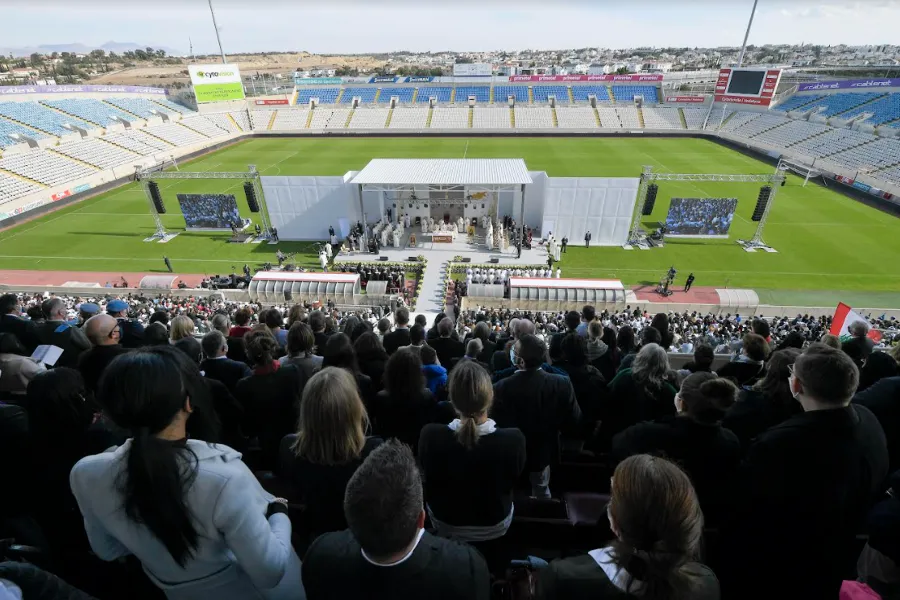
“Jesus is the physician: he alone is the true light that illuminates every man and woman, the one who gives us an abundance of light, warmth, and love. Jesus alone frees the heart from evil,” he said at the live-streamed Mass.
The pope was offering Mass on the second day of his visit to Cyprus, an island in the eastern Mediterranean Sea with a population of 1.2 million people.

The country is predominantly Orthodox Christian, with a Catholic minority of around 10,000 people — the estimated attendance figure at the Mass, according to the Holy See press office.
The booklet for the Mass, celebrated on the feast of St. Francis Xavier in the largest stadium in Cyprus, included Latin, English, Greek, and Italian.

The pope based his homily on the day’s Gospel reading, Matthew 9:27-31, in which Jesus heals two blind men who call out to him.
He reflected on three facets of the encounter: first, that the men went to Jesus for healing; second, that they shared their pain; and third, that they joyfully proclaimed the Good News.
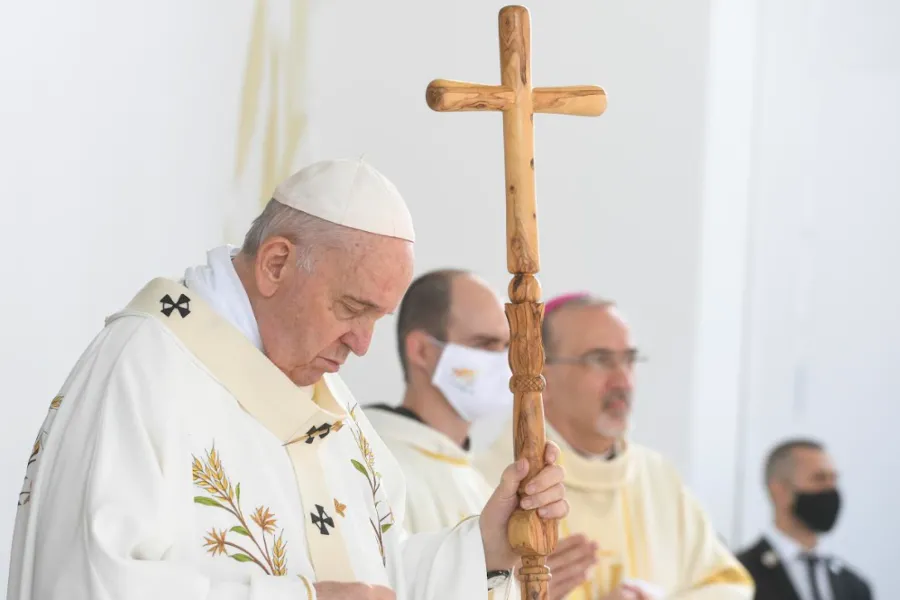
“Like those two blind men, we are often like wayfarers, immersed in the darkness of life,” he said.
“The first thing to do in response is go to Jesus, just as he tells us: ‘Come to me, all who labor and are heavy laden, and I will give you rest’ (Matthew 11:28).”
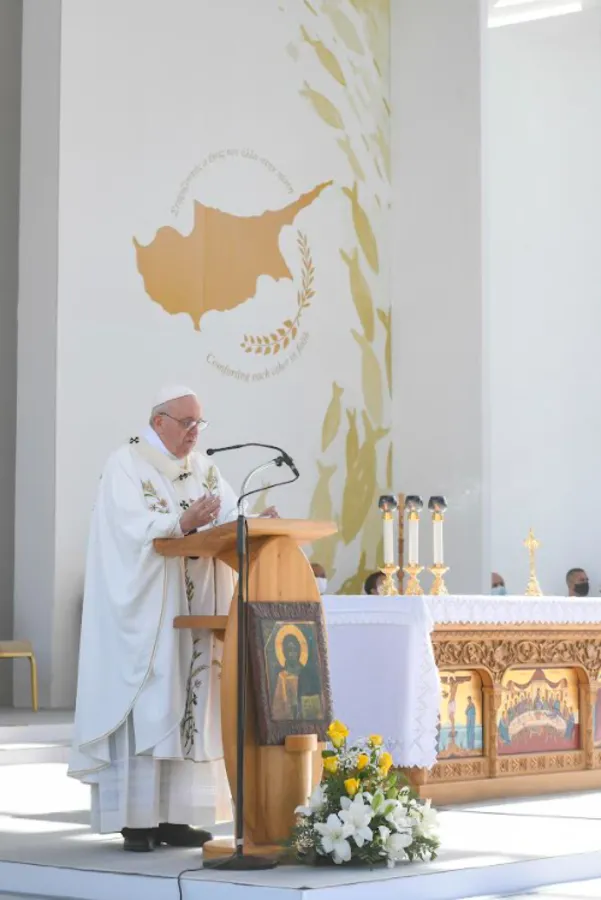
“Is there any one of us who is not, in some way, tired or heavy laden? Everyone. Yet, we resist coming to Jesus. Often we would rather remain closed in on ourselves, alone in our darkness, feeling sorry for ourselves and content to have sadness as our companion.”
The pope urged Catholics instead to follow Jesus, telling him their needs, and handing over their bitterness to him.
Pope Francis celebrated the Mass at the same altar that Benedict XVI used during his trip to Cyprus in 2010, when he became the first pope to visit the island.

Francis was flanked by Cardinal Bechara Boutros Rai, the leader of the Maronite Church, one of the 23 autonomous Eastern Catholic Churches in full communion with Rome. The cardinal had welcomed the pope to the Maronite Cathedral of Our Lady of Grace in Nicosia on the first day of his visit.
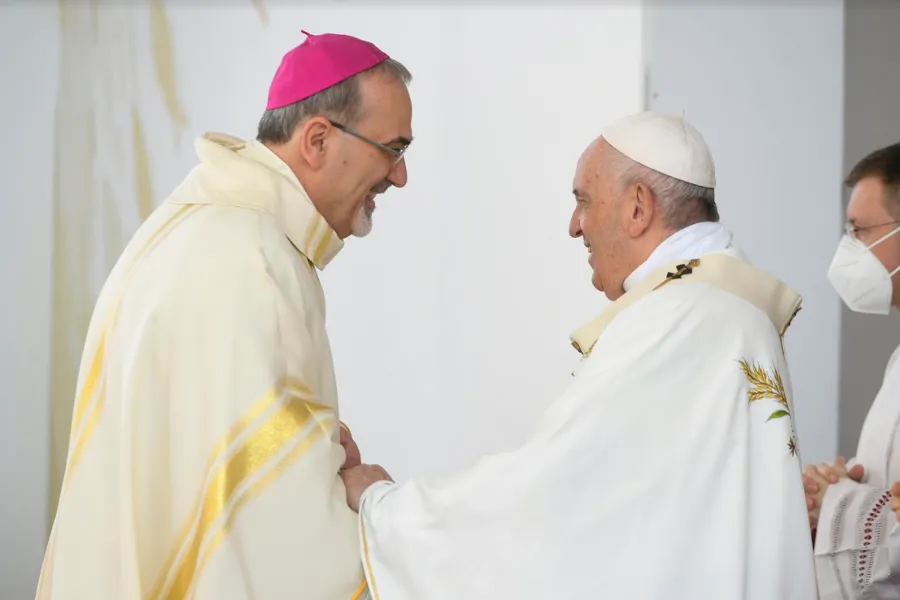
Also at the pope’s side in the home stadium of the Cyprus national soccer team was the Latin Patriarch Pierbattista Pizzaballa of Jerusalem, who oversees the pastoral care of Latin Catholics in Cyprus.
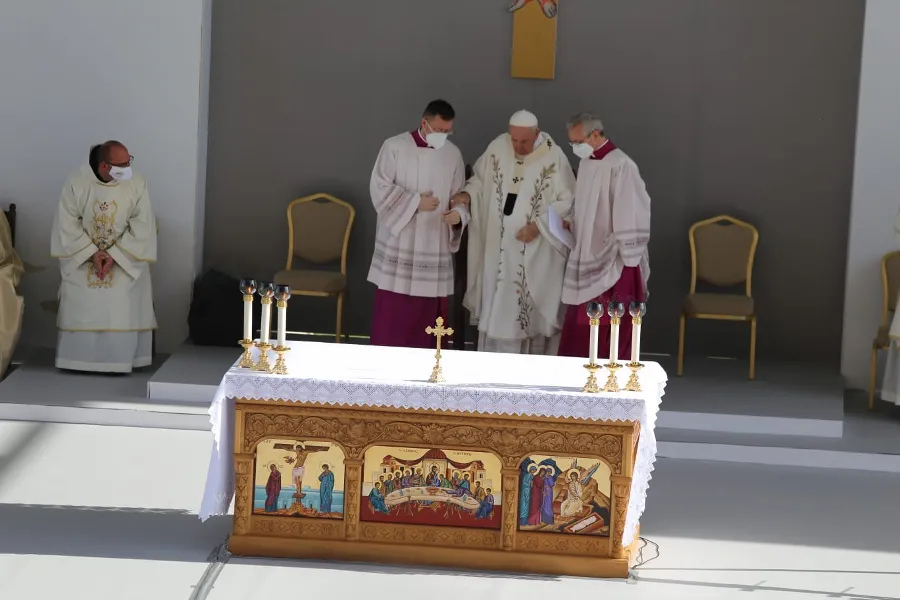
The pope, who turns 85 on Dec. 17, said that Catholics had much to learn from the way that the two blind men shared their suffering with Jesus, asking him to have mercy on them.
“Each of us is blind in some way as a result of sin, which prevents us from ‘seeing’ God as our Father and one another as brothers and sisters. For that is what sin does; it distorts reality: it makes us see God as a tyrant and each other as problems,” the pope reflected.
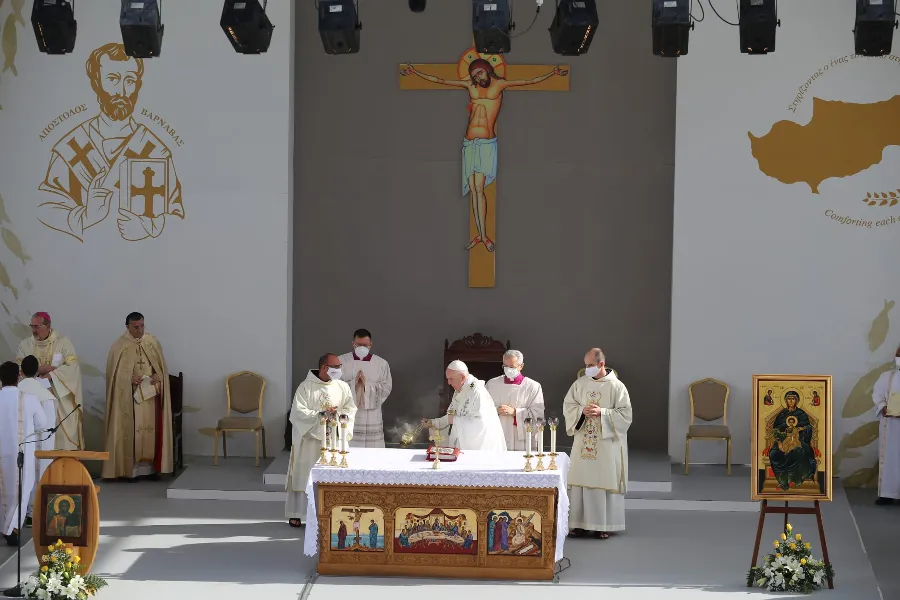
“It is the work of the tempter, who distorts things, putting them in a negative light, to make us fall into despair and bitterness. And a terrible sadness, which is dangerous and not from God, lurks well in solitude. So, one must not face the darkness alone. If we bear our inner blindness alone, we can become overwhelmed.”
He said that healing occurs when Christians carry their pain together, listening deeply to one another.
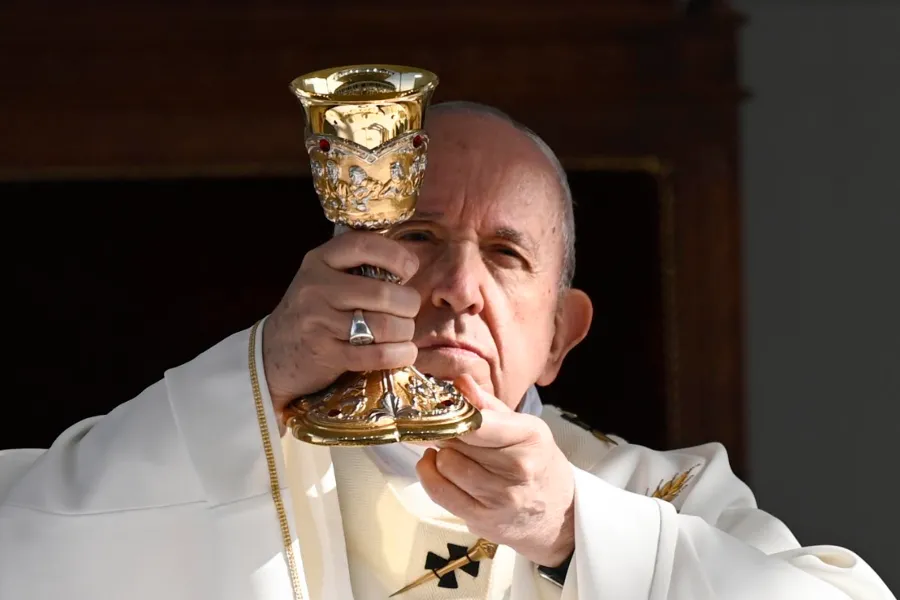
The pope noted that the two blind men began to share the news of their healing, despite Jesus’ request that they tell no one.
“From what we are told, it is clear that their intention was not to disobey the Lord; they were simply unable to contain their excitement at their healing and the joy of their encounter with Jesus,” he said.
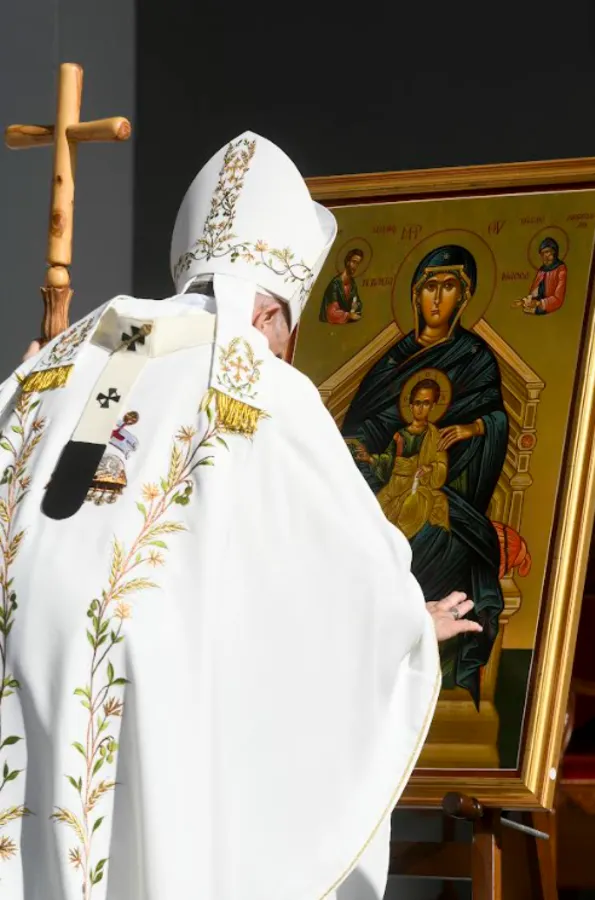
Quoting from his 2013 apostolic exhortation Evangelii gaudium, he continued: “This is another distinctive sign of the Christian: the irrepressible joy of the Gospel, which ‘fills the hearts and lives of all who encounter Jesus.’ The joy of the Gospel frees us from the risk of a private, gloomy, and querulous faith, and leads us into the dynamism of witness.”
He thanked Catholics in Cyprus for their witness to the Gospel.
“It is not proselytism — please, never proselytize — but witness; not a moralism that judges — no, don’t do that — but a mercy that embraces; not superficial piety but love lived out. I encourage you to keep advancing on this path,” he said.
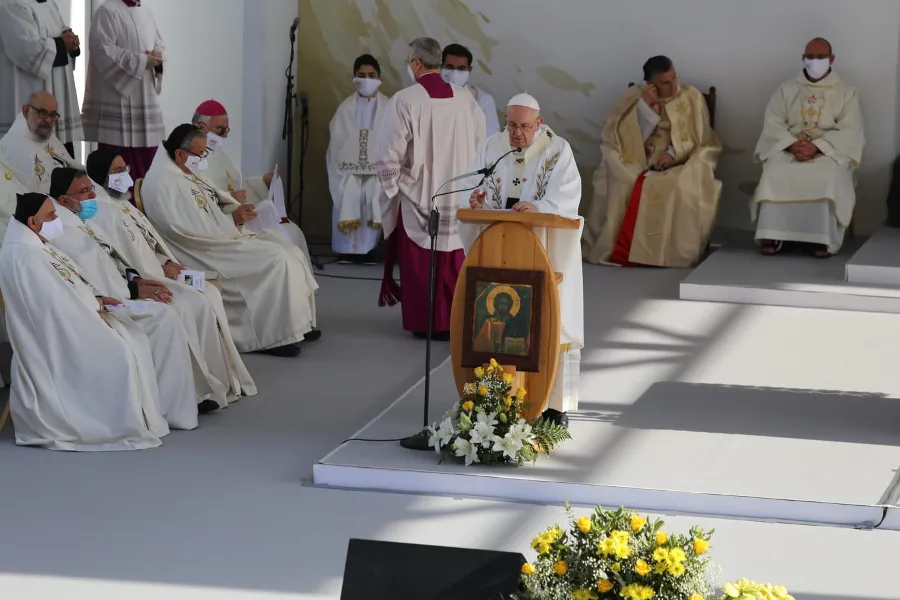
Concluding his homily, he said: “Brothers and sisters, the Lord Jesus is passing, passing also through the streets of Cyprus, hearing the cries of our blindness.”
“He wants to touch our eyes and hearts and to lead us to the light, to rebirth and raise us up within. He asks us the same question that he asked the two blind men: ‘Do you believe that I am able to do this?’ (Matthew 9:28).”
“Do we believe that Jesus can do this? Let us renew our faith in him. Let us say to him: Jesus, we believe that your light is greater than our darkness; we believe that you can heal us, that you can renew our fellowship, that you can increase our joy. With the entire Church, let us pray, all together: Come, Lord Jesus!”
If you value the news and views Catholic World Report provides, please consider donating to support our efforts. Your contribution will help us continue to make CWR available to all readers worldwide for free, without a subscription. Thank you for your generosity!
Click here for more information on donating to CWR. Click here to sign up for our newsletter.





Leave a Reply